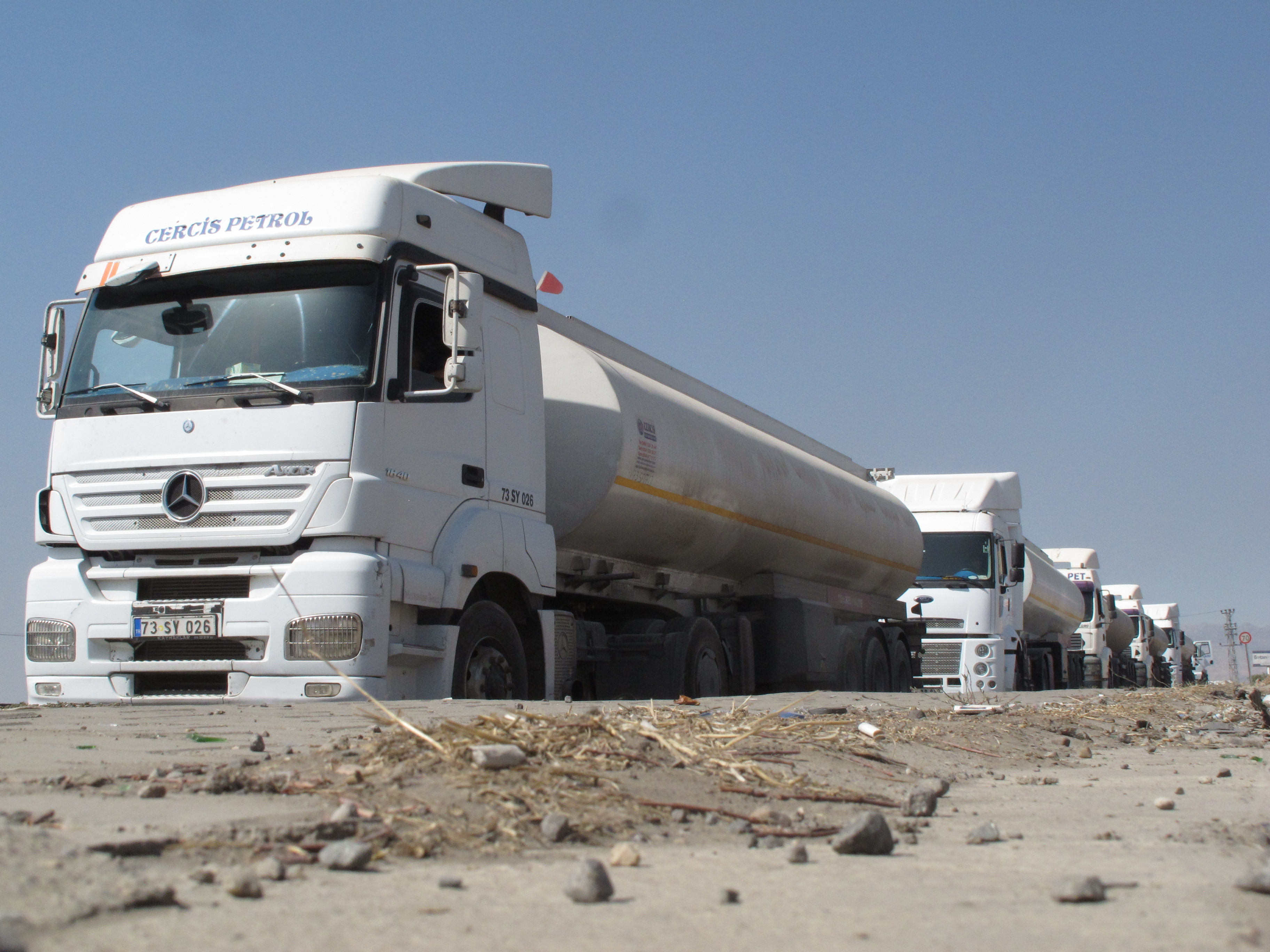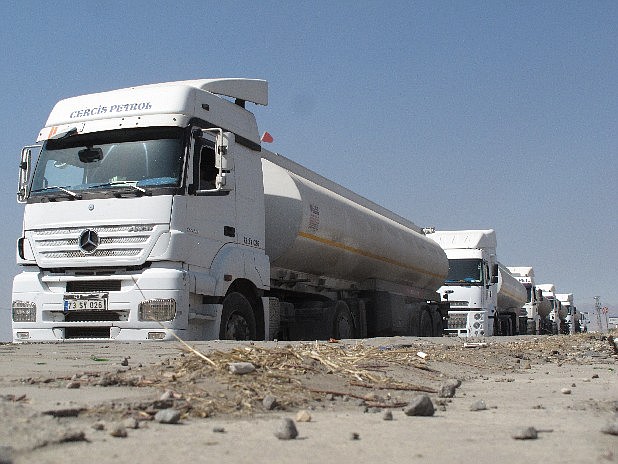 Trucks pile up on the Turkish side of the Habur Border Gate, separating Turkey from Iraq. Earlier this year a convoy of trucks which crossed through Habur was seized by militants from the Islamic State group, leaving 32 drivers hostage. For many foreigners, being caught by the group's fanatical fighters would mean months of uncertainty, torture and, eventually, a gruesome death. For driver Ozgur Simsek and his colleagues, captivity would last just over three weeks. Their trucks were confiscated, but no one was harmed and no ransom was paid. The episode paints a picture of a militant group unusually careful not to anger Turkey's government - and may offer insight into the mysterious release of 49 Turkish hostages just over a week ago.
Trucks pile up on the Turkish side of the Habur Border Gate, separating Turkey from Iraq. Earlier this year a convoy of trucks which crossed through Habur was seized by militants from the Islamic State group, leaving 32 drivers hostage. For many foreigners, being caught by the group's fanatical fighters would mean months of uncertainty, torture and, eventually, a gruesome death. For driver Ozgur Simsek and his colleagues, captivity would last just over three weeks. Their trucks were confiscated, but no one was harmed and no ransom was paid. The episode paints a picture of a militant group unusually careful not to anger Turkey's government - and may offer insight into the mysterious release of 49 Turkish hostages just over a week ago.SILOPI, Turkey - Turkish truck driver Ozgur Simsek was sleeping off a 1,000-kilometer (620-mile) fuel run to the Qayara power station in Iraq, he said, when he heard banging on his vehicle's door.
"IS took over last night," the power plant's foreman shouted, referring to the Islamic State group. "Empty your trucks and run!"
Simsek rushed to unload his tanker's fuel, he said, but it was too late. A battered pickup bearing the black-and-white logo of the Islamic State group rolled across the tarmac. Qayara's security guards, who only moments before had been joking around with the truckers, turned on the men, donning black masks and brandishing weapons - taking all 32 Turkish men hostage.
For many foreigners, being caught by the group's fanatical fighters has meant months of uncertainty, torture and, in some cases, a gruesome death. For Simsek and his colleagues, captivity would last just over three weeks. Their trucks were confiscated, but no one was harmed and no ransom was paid, according to a narrative of the June 10 attack and its aftermath pieced together by The Associated Press from interviews with drivers and a company executive.
The episode paints a picture of a militant group unusually careful not to anger Turkey's government, and may offer insights into the mysterious release of 49 hostages from Turkey's consulate in Mosul, Iraq, just over a week ago.
"The Islamic State treated these hostages in the way they did because they don't want to provoke Ankara," said George Readings, of London-based risk consultancy Stirling Assynt. "If Turkey decided to crack down on the Islamic State's support, recruitment, fundraising and oil-selling networks that run through Turkey, that would have a major impact on Islamic State's ability to take and hold territory in Syria and Iraq."
Turkey has been a reluctant member of the coalition fighting the Islamic State group. Until the latest hostage release, Turkish leaders had said they would not consider joining the coalition. In recent days, under intense pressure from NATO allies, Turkish President Recep Tayyip Erdogan has said he is mulling unspecified military cooperation.
Turkish officials reject the suggestion that they've tiptoed around the terror group, and appear to have recently made strides in intercepting foreign fighters and cracking down on oil smuggling. When asked whether Turkey is ambivalent toward the Islamic State militants, an adviser to the Turkish prime minister told AP: "Absolutely no."
"We as a country have been the subject of terrorist activities for the past 30 years," Cemalettin Hasimi said. "We know what it means."
Whatever the Turkish position, the Islamic State group's actions seem to reflect a certain pragmatism regarding Turkey.
For one thing, it's not clear whether the Turkish truckers were meant to have been captured. Vehbi Demir, one of the few truckers who spoke Arabic, said the atmosphere at a safe house where the Islamic State militants took some of them that morning was one of confusion and panic. He said he overheard a conversation between the kidnappers' leader, an Iraqi going by the name of Abu Abdullah, and his superiors. Demir said Abu Abdullah's voice went flat after informing them that he had kidnapped a bunch of Turks.
"It seems they weren't happy about it," Demir said.
For a while, two groups of truckers were kept separately -- some at the safe house, the others at the power plant -- but four days after the kidnapping the truckers and their vehicles were driven, under guard, to a U.S.-built airfield between Mosul and Qayara.
There, they were parked in a semi-enclosed engineering bay surrounded by four-meter-high concrete walls. The place was hot, dusty and crawling with scorpions, but despite the uncomfortable conditions the Turks said they were treated well.
The guard was relaxed. Drivers kept the keys to their trucks and could occasionally retreat to their air-conditioned cabs to watch satellite television and even use the batteries to recharge smartphones, which a few had kept hidden from their captors.
Food deliveries were irregular but included bread, cucumbers, watermelon and meat, which the truckers cooked with camping cylinders and bits of wood. Sometimes their Islamic State guards brought so much to eat that the truckers had to watch their leftover chicken and tomatoes wilt in the 50-degree-Celsius (120 F) heat.
Although the militants forbade the truckers to play "sinful" music from their cabs, the captives were largely left to their own devices. They were even allowed to smoke -- an unusual concession for the Islamic State group, which has outlawed smoking and publicly flogs violators.
Video shot from inside their makeshift prison shows a group of truckers watching television together on a carpets and mattresses laid out on the floor. They all smile for the camera.
Turkish driver Serdar Bayrak described his ordeal to the AP in his top-floor apartment in Cizre, an arid and unsettled transit town in Turkey across from the Syrian border. After a terrifying capture in which friendly guards "turned into monsters in five minutes," he said, it took less than a week for him to feel like "we were guests there."
The truckers believed that their Islamic State captors "would take care of Turkey's citizens in the best way possible and would not harm them in any way," he said. "They wanted their relationship to last with Turkey."
It isn't clear why the Islamic State group kept its Turkish captives for so long or why it released them when it did. Half-hearted ransom negotiations had gone nowhere, according to Mehmet Kizil, the CEO of Kizil Lojistik, which owned many of the captured tankers.
Kizil said Abu Abdullah initially phoned demanding a $5 million ransom -- which Kizil agreed to -- and then a $10 million ransom -- which Kizil also said he would pay -- before refusing to take his calls. The truckers described the negotiations as a farce, saying Abu Abdullah rarely even bothered to keep his phone on.
"It was a tactic to gain time," Bayrak said.
The truckers were released on July 4 after a night at an Islamic State base near the airport. Bayrak described the experience as frightening, saying he witnessed children as young as 8 or 9 holding weapons and encountered four suicide bombers with explosive vests getting ready to leave to target Iraqi forces.
That morning, a man the truckers knew as Sheikh Musa bid the 32 captives farewell, apologizing for having kept them hostage and insisting that no ransom had been paid.
Video covertly shot by one of the truckers shows his worn but happy-looking comrades being carried in pickup trucks under a giant Islamic State flag later that day. The men were eventually dropped at the side of the road and had to walk the rest of the way in the desert to Makhmour, near the Kurdish capital of Irbil. From there, a Turkish plane flew them home.
The truckers' low-key homecoming was in contrast to the rapturous welcome afforded to the 49 Turkish consulate workers. In both cases, however, the reason behind the release seems linked to maintaining the status quo with Turkey.
"Turks are our brothers," Simsek recalled one militant telling him just before he was released.
Readings said the release of both sets of hostages "reflects the fact that it's not in Islamic State's interests right now to enter into confrontation with Turkey."
Simsek said that while he is pleased that the consular workers were released, he remains angry at the theft of the trucks, which had left him and others saddled with tens of thousands of dollars of debt.
"We know that their loss will be compensated," Simsek said of the consular staff. "The only ones who will end up losing out are us."
